August 21, 2012
Edited by David Sanders
Specimen Days
August 21, 2012
1689 – William Cleland, Scottish poet and soldier, is born.
1721 – Lucretia W van Winter-van Merken, Dutch poet
, is born.
1929 – X. J. Kennedy, American poet, is born.
1940 – Ernest Lawrence Thayer, American poet (b. 1863)
, dies.
2005 – Dahlia Ravikovitch, Israeli poet (b. 1936), dies.
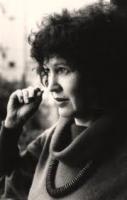 Remember you promised to come on the holiday
Remember you promised to come on the holiday
One hour after dark.
For my part, I won’t keep count of wraths
Or wrongs till you come.
And you: Don’t believe a word I say
Even when it’s wondrous or perverse.
—from “Trying” by Dahlia Ravikovitch
Poetry In The News
Fall Poetry Festival Lineups Announced
Poetry may make nothing happen, as W. H. Auden once wrote. But in October it will bring an unusual number of poets and poetry mavens to the greater New York area. The United States poet laureate Natasha Trethewey, the Pulitzer Prize-winner C. K. Williams, the former New Jersey poet laureate Amiri Baraka and dozens of others will gather in Newark on Oct. 11-14 for the 14th Geraldine R. Dodge Poetry Festival, a biennial event that bills itself as North America’s largest poetry event. Read more at the New York Times.
FBI Files on Sylvia Plath’s Father Shed New Light on Poet
 When FBI officers noted the “morbid disposition” of a German-born US suspect called Otto Plath during a first world war investigation, little did they realise how incisive their psychological assessment was, or its significance. Fourteen years later, he fathered Sylvia Plath, one of the 20th century’s most influential poets who continually battled against depression. Read more at the Guardian.
When FBI officers noted the “morbid disposition” of a German-born US suspect called Otto Plath during a first world war investigation, little did they realise how incisive their psychological assessment was, or its significance. Fourteen years later, he fathered Sylvia Plath, one of the 20th century’s most influential poets who continually battled against depression. Read more at the Guardian.
Poetry for Pedestrians
If you take your smartphone with a QR decoder along Bucknell University’s Poetry Path you’ll be able to hear contemporary poets read their work. Each of the 10 markers along the path through the campus and downtown Lewisburg is designed to let your phone link with a recording of the verse, or you can enjoy a printed version of a poem simply by reading it from the marker. Read more at the Standard-Journal.
World Poetry
Jamaica Poetry Festival Provides Feast
New Books
The Collected Poems of Lucille Clifton 1965–2010 by Lucille Clifton
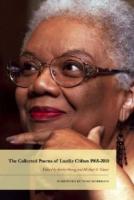 [Hardcover] BOA Editions Ltd., 720 pp., $35.00
[Hardcover] BOA Editions Ltd., 720 pp., $35.00
The Collected Poems of Lucille Clifton 1965–2010 combines all eleven of Lucille Clifton’s published collections with more than fifty previously unpublished poems. The unpublished poems feature early poems from 1965–1969, a collection-in-progress titled the book of days (2008), and a poignant selection of final poems. An insightful foreword by Nobel Prize–winning author Toni Morrison and comprehensive afterword by noted poet Kevin Young frames Clifton’s lifetime body of work, providing the definitive statement about this major America poet’s career.
On Poetry by Glyn Maxwell
[Hardcover] Oberon Books, 160 pp., $23.95
A collection of small essays and chapters each tackling a different element of this enchanting art form, all written by prolific & acclaimed British poet Glyn Maxwell. Each essay illustrates Maxwell’s “take” on poetry, his inspirations, his favorite writers, and indeed his thoughts on what makes a “good poem.”
Elected Friends edited by Matthew Spencer
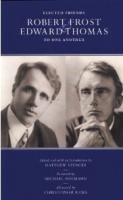 [Paperback] Other Press, 258 pp., $17.00
[Paperback] Other Press, 258 pp., $17.00
Robert Frost and Edward Thomas met in a bookshop in London in 1913. During the next four years, the two writers—Frost, an unknown poet who had sold his farm in New Hampshire in order to take his family to England for one last gamble on poetry and Thomas, a sad literary journalist—formed the most important friendship between poets since that of Wordsworth and Coleridge. Their friendship only ended with Thomas’ death in Arras, France, a casualty of the First World War. This book presents for the first time the full record, arranged chronologically, of what the poets wrote to, for, and about one another—their letters, poems, and Thomas’ review of Frost’s first two books.
Poems: Inside and Out by Omar Pound
[Hardcover] Stephen F. Austin University Press, 106 pp., $150.00
Poems: Inside and Out provides a selection of works by the poet Omar S. Pound, son of Ezra Pound and Dorothy Shakespear Pound. The late Omar Pound was a gifted translator, an authority on Persian poetry, and a gifted poet in his own right. 125 copies were hand set in Cloister Old Style type and printed on Somerset and superfine papers. The covers are printed blue book cloth over boards. The images are linoleum cuts by John Daniel and were printed from the original blocks.
Recent Reviews
The World’s Two Smallest Humans by Julia Copus – Review
 by Kate Kellaway
by Kate Kellaway
Reading Julia Copus’s remarkable collection – her third – makes one think about the risks involved in writing personal poetry. “Write about what you know” is not fail-safe advice because intimate poetry, unless of the highest quality, often comes across as paradoxically anonymous. Or worse, as many of the collections that come my way reveal, it can be as unsavoury and depressing as rummaging through dresses in a secondhand clothes shop. The wonder of Copus’s poems is that although they could hardly be more personal – childhood; the end of an affair; a sequence on IVF treatment – there is no self-indulgence and no sense, for the reader, of being an intruder. Read more at the Guardian.
A Hushed and Controlled Beauty
by Colm Tóibín
Harry Clifton’s realm has always been somewhere in the distance, or close to the exotic, or it has been a borrowed space, or it is nowhere much. He is content to be out of place. Exile is for him a natural state where his uneasy companions are bemusement, calm watchfulness, restlessness, regret and warm intelligence. His poetry is a hard-won poetry of the self. The self in this instance has a solitary disposition, a well-stocked mind and is capable of a sour philosophy. Read more at the Irish Times.
Correspondences
How Poet Laureate Natasha Trethewey Wrote Her Father’s “Elegy”
 by Alex Hoyt
by Alex Hoyt
Six or seven years ago, my father and I were fishing the Miramichi River in New Brunswick. It’s a great salmon river. We met a writer friend of his named Dave Richards, a novelist, and Dave hired a guide for us. This was a famous guide who’d taken people like Bill Clinton fishing on the Miramichi. Once we got out there into the river the guide gave us a quick lesson about how to fly-fish, how to cast. We practiced the motions, then we got our rods and started fishing. There was this almost mystical look to the river. It seemed reverent just to be quiet, going through the mist. Read more at The Atlantic.
An Interview with Jee Leong Koh
by Rose Kelleher
You’re clearly a well-rounded poet with a wide range of interests, but this being the Fetish issue I want to start by asking you about your racier poems. (Does anyone still say “racy”?) Many formal poetry journals tend to be somewhat conservative in their tastes, and I don’t see many of those on your book’s acknowledgments page. At the same time, many other journals aren’t terribly receptive to formal verse. So where do you submit a poem like “Chapter Six: Anal Sex” that’s sexually explicit as well as rhymed and metered? Read more at the Shit Creek Review.
Broadsides
“Embracing Geography”: Does New York City Incubate Poets?
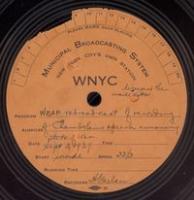 by Lauren Spiro
by Lauren Spiro
Poet, playwright, and novelist William Packard moderates this 1968 broadcast: Is there a New York poet? Joining Packard are the poets Stephen Stepanchev and Norman Rosten. Originally from Chicago, Stephanchev is the author of a critical survey of American poetry since 1945. Rosten, a native New Yorker and recipient of a Ford Foundation grant, is the author of several books of poetry and the plays “Come Slowly Eden” and “Thrive Upon the Rock.” Packard himself was considered part of the circle of poets to which the broadcast is devoted, yet he separates himself from them in service of objectively posing the question of the night. Read more at WNYC.
Blake in the Academe
by David X. Novak
In 1969, Northrop Frye introduced the new edition of his groundbreaking study of the works of the poet William Blake, with some offhand comments about its genesis: “The doctoral thesis is useful for encouraging intensive reading, but of very little use for gaining literary perspective, which takes years to develop and cannot be hurried. The present book never went through the thesis stage, and my interest in Blake had from the beginning been of the extensive kind.” Read more at Critical Flame.
Three Tendencies in English Language Poetry
by Amit Majmudar
A broad characterization of three tendencies in English language poetry, by no means exhaustive. Read more at the Kenyon Review.
Drafts & Fragments
When Bad Poetry and Basic Computer Graphics Collide
Series of 1960s films tried to merge graphics with poetry and freeform jazz.
Envoi: Editor’s Notes
An English-to-English Translation of Emily Dickinson’s Poetry
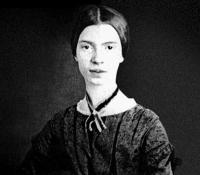 by Emily Temple
by Emily Temple
So like everyone else, you love Emily Dickinson’s poems — but have you ever wished they were a little, well, shorter? No? They’re already generally quite short, you say? Well, hear us out. In The Emily Dickinson Reader: An English-to-English Translation of Emily Dickinson’s Complete Poems, published this week, Paul Legault “translates” each of Dickinson’s 1,789 poems into pithy, irreverent, and often insightful modern missives. There’s still just as much death, despair, flowers, and sexiness, but in a new streamlined form perfect for cocktail parties. Read more at Flavorwire.
Perfect for cocktail parties? I remember my parents having novelty cocktail napkins with drawings and jokes on them; maybe something like that would work. As much as I try to understand the purpose of publishing this (might it take people back to the originals and give them a fresh look at them?), I just can’t. It’s clever after a fashion, but finally, it is a novelty. How many times, after the first, would you go to it on the shelf? Maybe there’s more to it than can be gleaned from the review above. But it reminds me of a more ambitious novelty: The Brand-X Anthology of Poetry, a parody of the [Burnt] Norton, which covers the whole of English poetry from the Middle-Aged [sic] to the Twentieth Century (which begins with Ezra Pound issuing the “Harriet Monroe Doctrine”). Seriously funny. But there were many hands at work in providing the parodies including Henry Taylor, Kenneth Koch, Michael Heffernan, and many others. Speaking of translating Emily into contemporary English, Robert Frost in the Brand-X Anthology is quoted as saying “Writing free verse is like playing tennis without a hairnet.” Who could disgree with that? I can heartily recommend this novelty for all students of English poetry.
—David Sanders